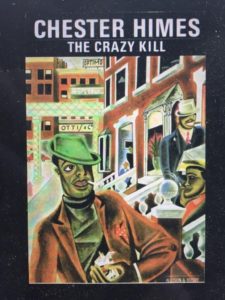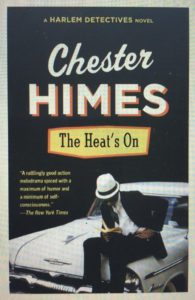Chester Himes
(1909–1984), Black Cleveland author regarded by some critics as the literary
equal of Dashiell Hammett and Raymond Chandler. Ishmael Reed said Himes had taught him “the difference between a black detective and Sherlock Holmes.” It would be more than 30 years until another black mystery writer, Walter Mosley, and his Easy Rawlins and Mouse series, had even a similar effect.
Himes’ novels If He Hollers Let Him Go and The Lonely Crusade charted the experiences of the wave of black in-migrants drawn by the city’s defense industries, and their dealings with the established black community, encounters with racism, and painful truths many of his readers were not yet ready to hear.
“He began writing in the early 1930s while serving a prison sentence for armed robbery,” notes the profile of Himes that accompanied his recognition by the 11th Annual Goodreads Choice Awards. “From there, he produced short stories for periodicals such as Esquire and Abbott’s Monthly. When released, he focused on semi-autobiographical protest novels. In 1953, Himes emigrated to France, where he was approached by Marcel Duhamel of Gallimard to write a detective series for Série Noire, which had published works from the likes of Raymond Chandler, Dashiell Hammett and Jim Thompson. Himes would be the first black author included in the series.
The resulting Harlem Cycle gained him celebrity when he won France’s Grand Prix de Littérature Policière for La Reine des Pommes (now known in English as A Rage in Harlem) in 1958.
Three of these novels have been adapted into movies: Cotton Comes to Harlem, directed by Ossie Davis in 1970; Come Back, Charleston Blue (based on The Heat’s On) in 1972; and A Rage in Harlem, starring Gregory Hines and Danny Glover in 1991.” Cleveland-based Belt Revivals is thinking about bringing out a new edition of one of Himes’s novels.
Oberlin professor and affiliate faculty in Africana Studies Gillian Johns sums up the case for honoring Himes as follows: “Chester Himes, who published some of the most simultaneously entertaining and socially provocative hardboiled detective fiction ever written about the American urban scene (think of the novel Cotton Comes to Harlem, made into a classic ‘blaxploitation’ film in 1970), is very unfortunately not a household name. Himes came from a middle-class family, spent his teenage years in Cleveland, where he graduated from East Hugh before enrolling at Ohio State University, but as a young man he became a gambler, hustler, burglar, and then a convict.

The London Times found “lasting value” in Himes’Books “—as thrillers, as streetwise
documentaries,as black writing at its ribald and unaffected best.”

What Chandler did for Los Angeles, Chester Himes would do for Harlem
“He then moved to Paris and began writing detective fiction,” Johns continues, “and in the eight-volume series he published, his detective duo Grave Digger Jones and Coffin Ed Johnson raged through the Harlem streets during the late 1950s and 1960s, solving murders while philosophizing about what actually should and could count as crime in their city. His social commentary and analyses were brilliantly ahead of the curve when it came to the explorations of absurdity and violence he set in an only slightly hyperbolized Harlem under the pressure of a capitalist economy lacking legitimate opportunities.”
What Raymond Chandler did for Los Angeles, it was said, Himes was to do for Harlem. The Sunday Times of London’s reviewer pronounced him “the greatest find in American crime fiction since Chandler,” adding that, in his opinion, “These books have lasting value—as thrillers, as streetwise documentaries, as chapters of black writing at its ribald and unaffected best.”